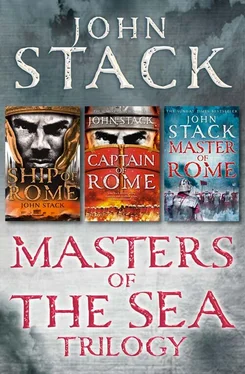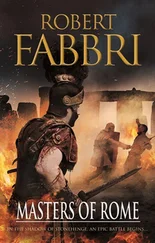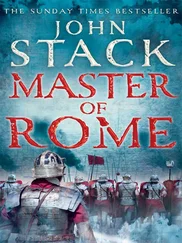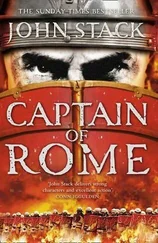‘Captain,’ the admiral began, ‘I have studied all our maps and charts of these waters. I can find no reference to the whirlpool we encountered this morning. The Romans tricked us using superior local knowledge. We could not have been aware of their plans.’
Maghreb visibly relaxed and, although he still stood to attention, Gisco noticed that the tension had gone out of his shoulders and he was no longer holding his breath.
‘They will not escape the next time they cross our path,’ Maghreb added, sensing the admiral’s mood.
‘No, Captain, they will not,’ Gisco replied, his voice cold.
The two men stood facing each other in silence and Maghreb felt uncomfortable once more under Gisco’s gaze. The admiral’s expression was impossible to read, but the captain sensed that he would evade blame for the escape of the Roman galley.
He was wrong.
‘Guard commander!’ Gisco suddenly ordered, breaking the heavy silence. ‘This man disobeyed my orders, he must be punished. Seize him.’
Cronus looked at two of the guards and jerked his head towards the captain. They immediately rushed forward and grabbed his arms. Maghreb’s initial shock at the admiral’s words gave way to fear and he struggled against the men holding him.
‘But …’ he pleaded, fear consuming him, his mind unable to comprehend the admiral’s actions, ‘you said yourself, I couldn’t have known of the Romans’ trap. We were taken by surprise. We—’
‘Enough!’ Gisco bellowed, cutting across the captain’s pleas. ‘You were ordered to continue your pursuit of the Roman vessel. You did not and they escaped. There are no excuses.’
‘But …’ Maghreb began again, hopelessness overwhelming him.
‘Take him away, Commander,’ Gisco ordered. ‘Have him straddle the ram.’
The pronounced sentence instantly silenced Maghreb, an overwhelming wave of terror engulfing him. Cronus saluted and led the condemned man from the cabin.
Hamilcar had watched the entire exchange with disbelief. In the two months since being appointed to shadow Gisco, he had become increasingly aware of the man’s serpentine nature. Hamilcar had witnessed scenes like this before and as always his honour was offended by Gisco’s methods. The admiral always lulled an enemy before striking and Hamilcar knew it served no purpose other than to satisfy Gisco’s ego.
The admiral noticed Hamilcar’s expression as he sat back down behind his desk. The captain’s renewed cries for mercy could be heard through the cabin door as he was dragged up onto the deck above and brought forward to meet his fate.
‘You disapprove, Barca?’
Hamilcar kept his peace, sensing Gisco’s dislike for his position, knowing the admiral wanted to provoke a confrontation to justify his actions.
‘Let me tell you something, young man,’ Gisco began, his voice patronizing. ‘Fear is what drives men. Fear of failure. Fear of retribution. Fear of—’
‘Hannibal Gisco?’ Hamilcar interrupted, his own censure evident in every word.
‘Yes,’ Gisco replied, as if trying to explain his reasoning to an obtuse child, ‘fear of Hannibal Gisco. Maghreb was ordered to hunt down the Roman galley and he failed. Now he will pay for that failure with his life.’
Hamilcar bit back his retort, knowing the futility of arguing against a man such as Gisco. The man had no honour, no sense of the true motivation of men, the drive that inspires them to create and control an empire. He got up slowly from the couch, sensing the admiral’s dismissive gaze as he moved towards the door. He walked out without a word, glad to be out of Gisco’s company.
Hamilcar reached the deck as Cronus and two others were climbing back over the forerail. Hamilcar walked down the length of the galley, ignoring the guard commander as they passed each other amidships. By the time he reached the foredeck, Cronus had issued the order for the Melqart to get back under way. Hamilcar looked over the forerail to the figure of Maghreb below. He was tied in a supine position, face up, over the six-foot ram of the galley. With the ship at rest, half of his body was submerged under the water; however, as the quinquereme picked up speed to reach standard, the waves began to crash over him. Maghreb would drown slowly. Very slowly.
Hamilcar watched in dread fascination as Maghreb tried to draw breath between waves. An errant crest filled his mouth with water and he coughed and spluttered to clear his tortured lungs. He gained a moment’s respite but within a minute he was caught again. Maghreb threw his face up and Hamilcar was given a vision of pure terror. A cry of anguish was cut short by the cold sea, her unending current oblivious to the fate of the terrified captain. Maghreb cleared his throat again but all the while his lungs continued to fill with water.
At standard speed, in calm coastal waters, Hamilcar estimated it would take at least thirty minutes for Maghreb to drown. The Melqart was flanked on both sides by other galleys, many of their crew lining the rails to witness the captain’s punishment. Hamilcar could see from their expressions that Gisco was achieving his aim of inspiring fear in the heart of each man. Maghreb was silent, his thrashing arms and manic face the only testament to his futile struggle against the sea. Hamilcar stepped back from the forerail, hiding the captain from his line of sight.
Hamilcar had spent the first ten years of his military career in Iberia, stationed in Malaka on the southern coast. It was the frontier of the Carthaginian empire, a new expansion being forged from the lands of the Celts who had formerly controlled the isolated peninsula. Hamilcar had made his name and cemented his standing amongst the ancestors of his ancient line in that campaign. The fight had been brutal, the territory hard fought and won. Hamilcar had led many men to their deaths, had ruthlessly thrown them against the relentless attacks of the Celts in an effort to secure victory. But always with honour, always with the strength of his men harnessed through loyalty to Carthage and their commander.
Hamilcar had yet to meet the Romans in battle. Years before, Carthage and Rome had fought together as allies against Pyrrhus of Epirus. It was an alliance that precipitated the current conflict, a once-honourable union that Rome had established to save her lands before turning the allied victory into a dishonourable invasion of Sicily on a pretext of saving the people of Messina from the armies of Syracuse, an invasion that threatened Carthage’s extensive commercial interests on the island.
The die was now cast. The Roman trireme had escaped and so it was only a matter of time before Hamilcar would face the enemy in battle. His gaze hardened at the thought, savouring the anticipation of expelling the Romans from Sicily, re-establishing the supremacy of his people as masters of the Mediterranean.
A guard detail of sixty legionaries, half a full maniple, stood in formation in the courtyard of the villa with a centurion walking up and down the ranks inspecting the men. A signifer stood at the head of the formation, holding aloft the maniple’s standard. The gentle offshore breeze ruffled the cloth of the standard, the gold discs hanging beneath clinking against each other like wind chimes. Septimus studied it and saw the symbol of a bull, marking it as a maniple of the Second legion, one of the four now campaigning in Sicily. Septimus had belonged to the Ninth Legion, encamped with the Second just beyond the town of Brolium. The other two legions, the Sixth and Seventh, were stationed further south, near the border with Syracuse, a politically motivated location meant to keep Hiero II, the king of Syracuse, bottled up. Their static location meant the two legions at Brolium would bear the brunt of the spring campaign.
Читать дальше












